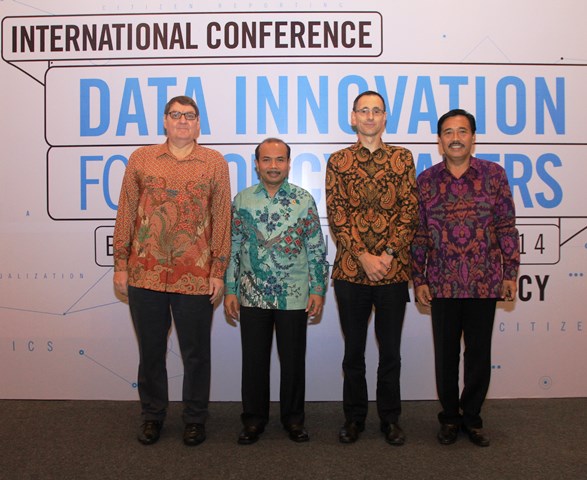The Indonesian Ministry of National Development Planning (Bappenas), in collaboration with Pulse Lab Jakarta, the Knowledge Sector Initiative and the UNDP Innovation Facility held an international conference on Data Innovation for Policy Makers in Bali on 26 and 27 November 2014. They were two days full of excitement! Geeks met civil servants, international development practitioners interacted with local activists and private sector representatives sat alongside government officials. Everyone discussed big data and real-time analysis techniques to plan, monitor and evaluate social development policies and programs.
Here are the key messages highlighted during day one:
- Data thief no more: Many researchers struggle to get access to data. This is particularly true in Indonesia. The lesson was that data stored and managed by public institutions could be made more accessible to researchers and the public. Indonesia is moving in this direction and Minister Andrinof highlighted the country’s role as one of the founding states that established the Open Government Partnership.
- Real time data can save lives: In Indonesia, every year the equivalent of four planes full of people die in traffic accidents during the holiday season. This can and should be avoided and data can help. Near-real-time data could warn people, and at the same time help police respond when accidents occur. As real-time data analysis becomes more and more a reality, the next step is to find ways to use the knowledge generated through analysis. For example, real-time analysis of data enables policy makers to respond quickly to emergencies and disasters, and benefits citizens.
- Citizens’ voices can be heard through data: From India to Indonesia, municipalities and rural communities all share a similar basic need: citizens want their voice to be heard by decision makers. The first Chief Data Scientist in Singapore was at the conference and described the role of his team in analyzing cross-agency data sets as aiming to enhance citizens’ quality of life. Other examples at the conference showed that social media is a fast-growing channel for citizen engagement at the grassroots. The message is: if a government seeks citizen input through social media and data innovation, citizens step in and contribute.
- Push the boundaries: The debate on data is moving in the direction of innovation across data, rather than the distinction between old and new data. Governments can make use of data innovation to strengthen good governance at all levels. This would need a positive attitude towards innovation and a willingness to push boundaries. Data innovation and technology are suggested tools to address geographical, income and development inequalities in Indonesia. Innovation requires experimentation: it is important to discuss the pros and cons of data innovation, but it is critical to take action with concrete safe-to-fail experiments on the ground.
- Data can be a new instrument for democracy: In his presidential debate on 9 June 2014, President Joko Widodo said that democracy is about listening to the voice of its citizens through dialogue. The development of data innovation is an opportunity for the Government of Indonesia to listen and make policy decisions based on what citizens say and know. Discussions at the Data Innovation conference showed that big data and data innovation are instruments to strengthen democracy. Data innovation and social media bridge regional disparities, address geographical challenges, shorten distances between government and citizens and provide space for discussion and validation.
Data do not automatically translate into better policy-making processes, but when they are interpreted, analyzed and critically discussed, they can help make decisions smarter, more transparent and more open.
To read more articles on Data Innovation for Policy Makers Conference, please click below links:
news/detail/data-innovation-for-policy-makers-conference-2014






